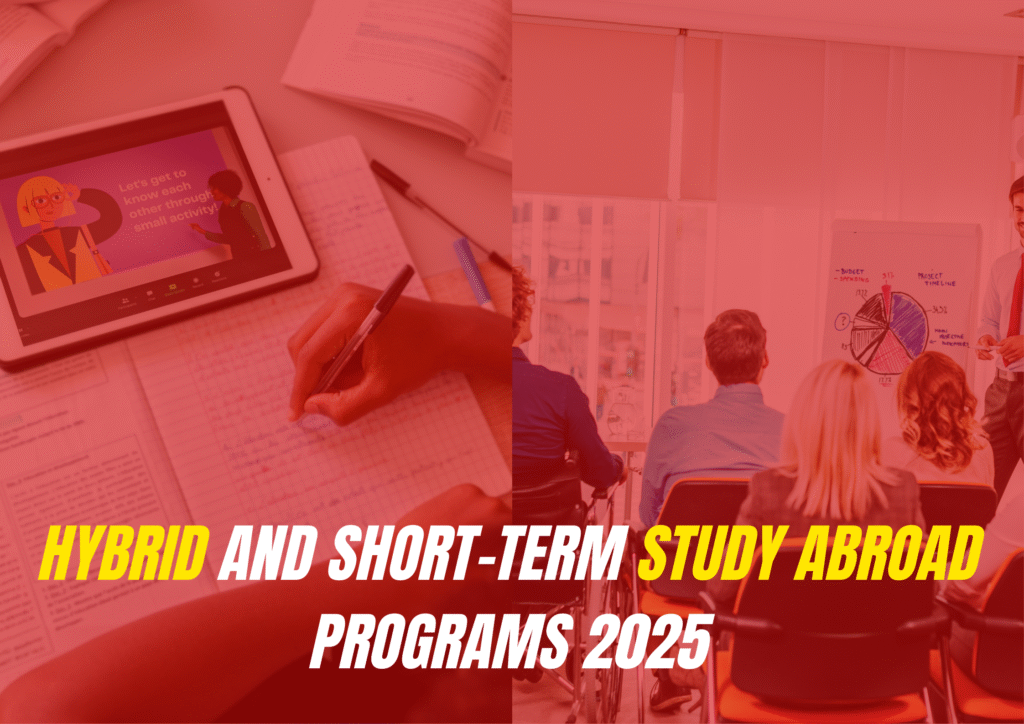Hybrid and short-term study abroad programs 2025 are becoming the top choice for international students seeking flexible, affordable, and career-driven global education. The rising demand for these alternative study options reflects a major shift in how students are balancing academic goals, practical skills, and cost efficiency in 2025.
Table of Contents
What Are Hybrid and Short-Term Study Abroad Programs 2025?
Hybrid study abroad programs combine online learning with in-person campus immersion. Students complete part of their coursework remotely, then attend intensive on-campus modules and cultural activities abroad. Short-term study abroad programs offer global education through summer schools, micro-credentials, exchange modules, and certificate courses—often lasting weeks to a few months rather than years.


Key Features
- Blended online and offline curriculum
- 30–70% remote coursework, 30–70% campus-based study
- Shorter duration: from 2 weeks to 6 months
- Lower overall costs and reduced travel/living expenses
- Visa flexibility and faster admissions
- Digital learning tools (virtual labs, AI personalized feedback, VR classrooms)
Why Hybrid and Short-Term Study Abroad Programs 2025 Are Trending
1. Affordability and Accessibility:
These programs cost 40–60% less than traditional, full-degree study abroad, making global education attainable to more students regardless of financial background.
2. Flexibility and Work-Life Balance:
Students balance family life, jobs, and academics, spending less time abroad, thus minimizing cultural and logistical challenges.
3. Technology Integration:
Advanced educational technology—VR labs, real-time collaboration, and personalized online content—has revolutionized the learning experience, making hybrid programs just as academically rigorous as fully in-person degrees.
4. Career Focus:
Employers now value digital literacy and global experience, making hybrid and short-term study abroad programs 2025 a competitive pathway to international jobs and networking.
5. Visa and Admission Ease:
Many hybrid and short-term programs bypass complex visa regulations and financial proofs required for regular degrees, appealing to students facing strict country entry policies.
Statistics and Global Impact
- Over 2,400 universities worldwide offer hybrid international programs as of 2025.
- Student demand: 67% of prospective international students now prefer programs with flexible study options.
- Enrollment in hybrid programs has increased 245% over three years, with completion rates 23% higher than fully online programs.
- Students save an average of £8,000–£15,000 annually on living costs and £2,000–£4,000 on travel expenses.
Popular Hybrid and Short-Term Study Abroad Destinations 2025
United Kingdom
- 150+ UK universities now offer hybrid programs in business, engineering, life sciences, and humanities.
- English-medium instruction and leading global university rankings.
- Flexible accommodation options near campuses for short-term students.
Germany, Ireland, France
- Fast-track STEM microdegrees and blended MBA programs.
- Subsidized tuition and strong internship networks.
- Language assistance and cultural immersion modules.
Australia, Canada, New Zealand
- Short-term and hybrid certificates in data science, sustainability, and healthcare.
- Extended post-study work rights for high-demand fields.
- Summer schools and exchange programs in Sydney, Melbourne, Auckland, and Toronto.
Japan, South Korea, Singapore
- Month-long tech bootcamps and hybrid engineering programs
- Digital learning combined with cultural exchange.
- Scholarship and visa support for program participants.
Top Hybrid and Short-Term Courses in Demand for 2025
Artificial Intelligence & Data Science:
Hybrid programs in AI and data analytics pair online lectures with intensive campus-based projects and internships—giving students both digital proficiency and hands-on experience.
Business Analytics & FinTech:
Short-term business schools offer microcredentials and global case-study modules, letting participants build CVs and credibility for international job markets.
Healthcare & Biotech:
Hybrid nursing, public health, and biomedical engineering programs are particularly suited to healthcare professionals seeking international exposure on a budget.
Environmental Science & Sustainability:
Universities across Europe and Australia are launching hybrid certificates in climate change, green energy, and urban sustainability as demand surges.
Creative Tech (AR/VR, Design, Blockchain):
Month-long short-term immersive courses allow creative professionals to earn international credentials and experience modern tech applications abroad.
Pros and Cons of Hybrid and Short-Term Study Abroad Programs 2025
| Aspect | Pros | Cons |
|---|---|---|
| Cost | Lower tuition, living, and travel expensesuninist | Limited campus time, may miss full immersion |
| Flexibility | Work-life balance, remote learning, keeps commitments | Program schedules may be intensive |
| Academic Quality | Use of advanced tech, global perspective | Some programs may lack full degree status |
| Visa/Admission | Short-duration, less paperwork, easier entry | Not all countries offer post-study work |
| Career Prospects | Valued by employers, fast upskilling | Sometimes less eligibility for full-time job |
How to Apply: Steps for Hybrid and Short-Term Programs
- Research Programs:
Visit university and aggregator sites to find suitable hybrid/short-term study abroad programs 2025. - Check Eligibility:
Review admission requirements and English language standards. - Prepare Documents:
Gather transcripts, SOPs, reference letters, and portfolio items. - Submit Application:
Apply through university portals or verified study abroad platforms. - Secure Accommodation:
Book flexible housing or student apartments for campus phases. - Organize Travel and Budget:
Plan short-term travel, insurance, and living expenses for the duration abroad.
External Resources for Hybrid and Short-Term Study Abroad Programs 2025
- Study Abroad in UK – British Council
- Hybrid Programs Explained – Uninist
- Short-Term Global Programs – Times of India
- Student Mobility Trends OECD
Conclusion
Hybrid and short-term study abroad programs 2025 offer a perfect blend of flexibility, affordability, and global learning for students ready to launch international careers. As technology transforms education, these innovative options empower more students to access world-class academic and professional experiences—breaking barriers of cost, location, and traditional study constraints. By choosing a program tailored to personal goals, students win the advantages of global networks, cutting-edge skills, and an education built for the future.

